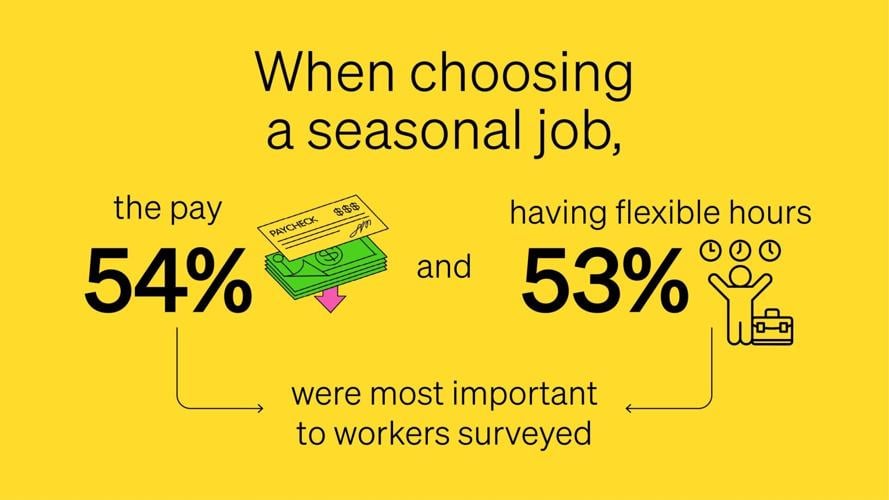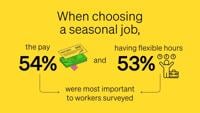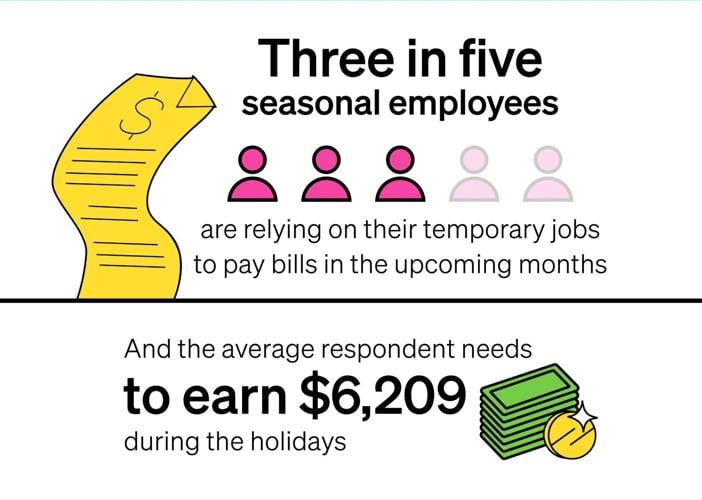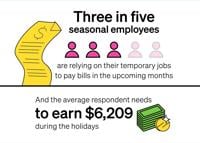
(Photo by Pavel Danilyuk via Pexels)
Three in five seasonal employees are relying on their temporary jobs to pay bills in the upcoming months.
A new survey of 1,000 Americans — who have or plan to have a seasonal job — revealed that 60% of seasonal employees need these jobs to pay for necessities throughout the holiday season.
And the average respondent needs to earn $6,209 during the holidays.
Millennials are the most reliant on their seasonal jobs — 65% said these were necessary to cover their bills, compared to 41% of baby boomers.
Not only that, but millennials are looking to earn the most, at $7,258. On the other end, baby boomers are hoping to earn just $3,277.
Commissioned by Current and conducted by Talker Research, the survey looked at trends for seasonal workers — exploring why people are picking up these roles — and their financial worries around the holidays.
Sixty-three percent of seasonal employees are worried about affording everything they need during the holiday season.
Which is likely why, in addition to paying bills and other necessities, respondents are using the funds from their seasonal jobs specifically to pay for the holidays.

(Photo by cottonbro studio via Pexels)
They’re planning to spend their earnings on holiday gifts for friends and family (39%), provide their kids with a nicer holiday (22%) and purchase airline tickets to visit loved ones for the holidays (9%).
“Seasonal jobs are an essential source of income for millions of Americans every year,” said Erin Bruehl, vice president of communications at Current. “These workers keep our country running during one of the busiest times of the year and rely on these roles, whether in retail, delivery, hospitality or other essential roles to pay for necessities, or help make the holidays more special. It’s also important that they have financial institutions to rely on so they can get the most from their hard-earned money.”
For a quarter of respondents (26%), seasonal work is their only source of income — and of those, 21% were laid off this year.
But the majority have another job, whether full-time (33%) or part-time (26%).

(Talker Research)
Regardless, when choosing a seasonal job, the pay (54%) and having flexible hours (53%) were most important to workers surveyed.
Younger workers were slightly more focused on the pay (56% of millennials vs. 46% of baby boomers) — while older generations thought flexible hours were more important (55% of baby boomers vs. 50% of millennials).
Despite the benefits these jobs can provide, the majority of seasonal workers (58%) wished they didn’t need to take an extra job.
“The holidays are a special time for millions of people to celebrate with people they love,” said Bruehl. “It’s understandable that many people don’t want to feel the need to pick up a seasonal job, and are only doing so out of necessity. It’s therefore even more important that their financial institution supports them in getting the most value from every paycheck not just during the holidays, but all year long to give them the financial flexibility they need without feeling like they’re falling behind.”

Äào Viá»t Hoàng
Survey methodology:
Talker Research surveyed (1) 1,000 Americans and (2) 1,000 Americans who have, or plan to have, seasonal jobs. There were also quotas in place to ensure 200 respondents, minimum, per generation. The survey was commissioned by Current and administered and conducted online by Talker Research between Sept. 17–24, 2025.
We are sourcing from a non-probability frame and the two main sources we use are:
- Traditional online access panels — where respondents opt-in to take part in online market research for an incentive
- Programmatic — where respondents are online and are given the option to take part in a survey to receive a virtual incentive usually related to the online activity they are engaging in
Those who did not fit the specified sample were terminated from the survey. As the survey is fielded, dynamic online sampling is used, adjusting targeting to achieve the quotas specified as part of the sampling plan.
Regardless of which sources a respondent came from, they were directed to an Online Survey, where the survey was conducted in English; a link to the questionnaire can be shared upon request. Respondents were awarded points for completing the survey. These points have a small cash-equivalent monetary value.
Cells are only reported on for analysis if they have a minimum of 80 respondents, and statistical significance is calculated at the 95% level. Data is not weighted, but quotas and other parameters are put in place to reach the desired sample.
Interviews are excluded from the final analysis if they failed quality-checking measures. This includes:
- Speeders: Respondents who complete the survey in a time that is quicker than one-third of the median length of interview are disqualified as speeders
- Open ends: All verbatim responses (full open-ended questions as well as other please specify options) are checked for inappropriate or irrelevant text
- Bots: Captcha is enabled on surveys, which allows the research team to identify and disqualify bots
- Duplicates: Survey software has “deduping” based on digital fingerprinting, which ensures nobody is allowed to take the survey more than once
It is worth noting that this survey was only available to individuals with internet access, and the results may not be generalizable to those without internet access.
















